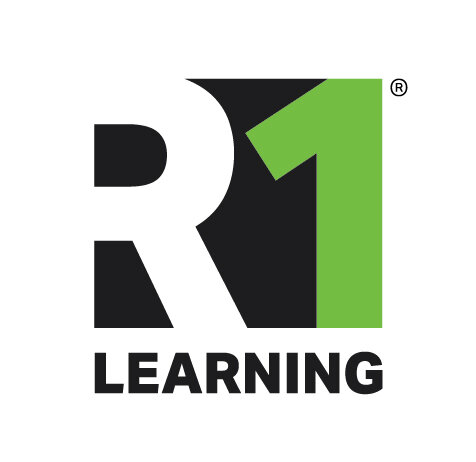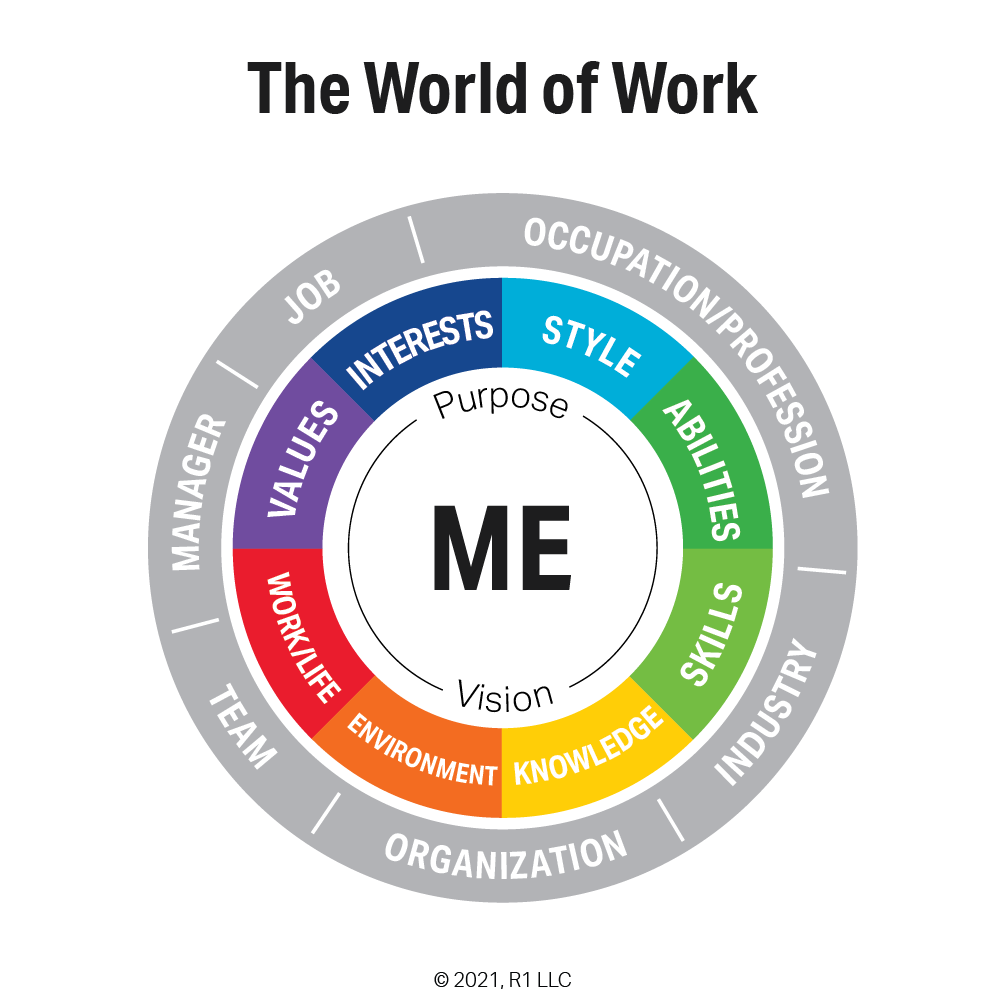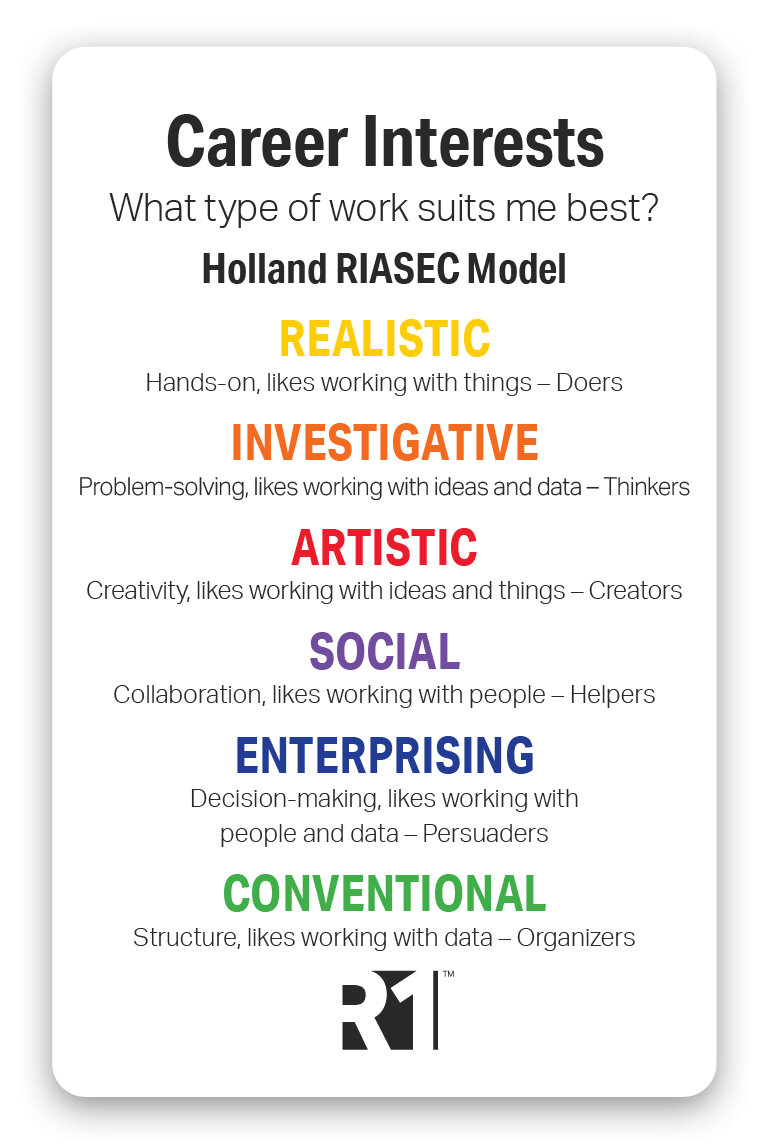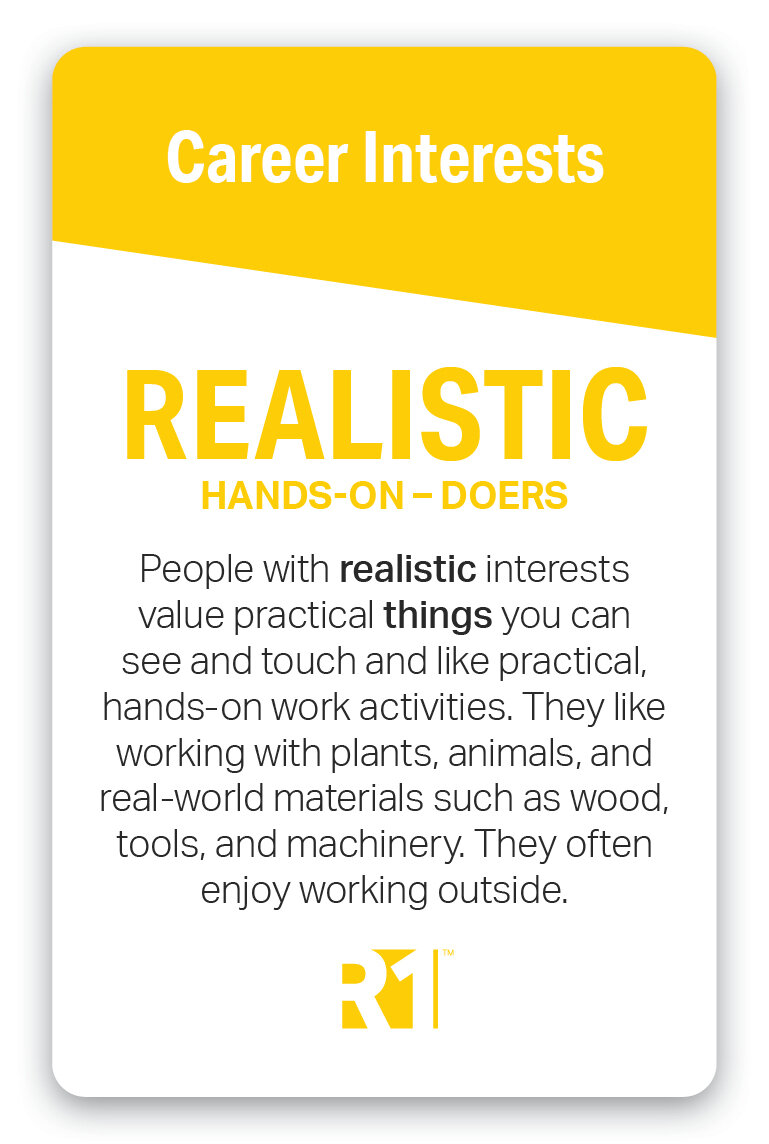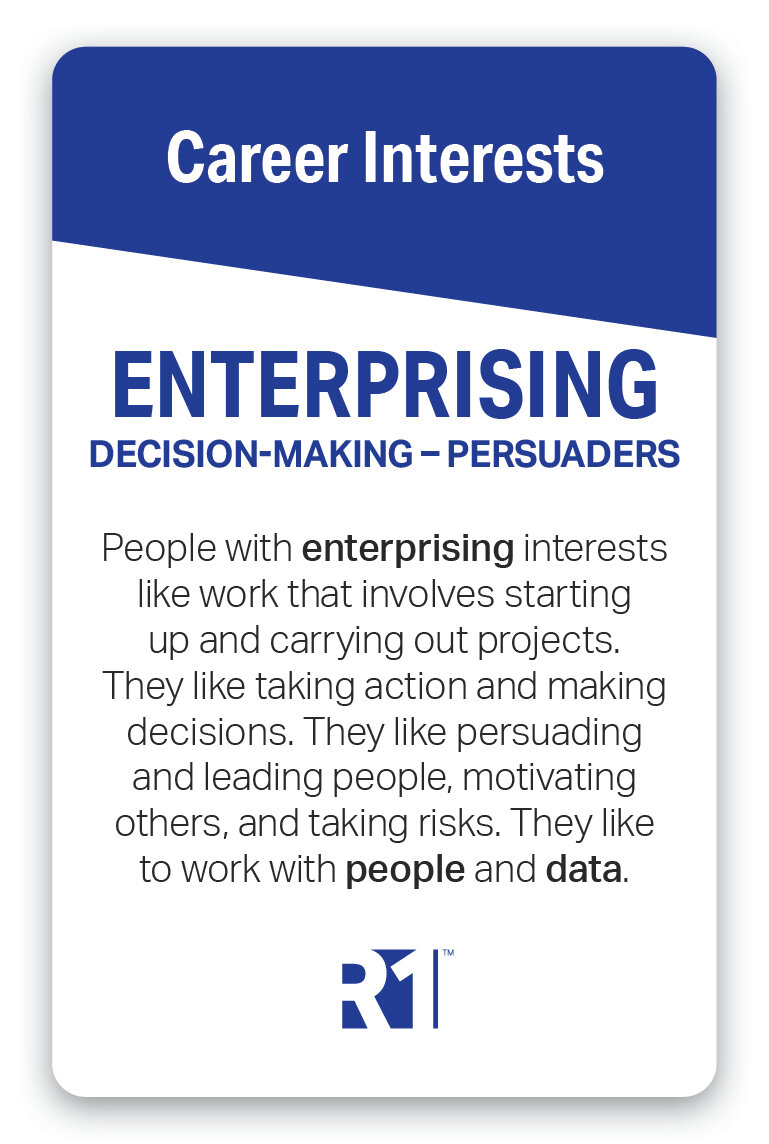6 Career Interest Types — How Do I Engage Individuals About Work and Career Options?
One of the key ingredients for exploring career options and thriving at work is knowing what we love to do — our career interests. This is where passion comes from. When we are engaged in work that is aligned with our natural interests, we are healthier, happier, and contribute more fully. Engagement, enjoyment, learning, creativity, and contribution increase, while dissatisfaction, boredom, and stress dissipate.
So how do I find the type of work that suits me best from a career interest perspective? Dr. John Holland introduced the Holland RIASEC Model (based on personality types), now a leading theory that highlights six career interest types — Realistic, Investigative, Artistic, Social, Enterprising, and Conventional. The Holland Model (the RIASEC Codes) and the theory of careers and occupational choice is the foundation of the Occupational Information Network (O*NET), the primary source of occupational information in the United States. O*NET is a free online service that contains standardized descriptions of almost 1,000 occupations, organized by RIASEC Codes. O*NET defines the knowledge, skills, and abilities that are required to be successful in each occupation. O*NET is a wonderful (and searchable) resource for anyone engaged in finding a career that best fits their interests. Many community workforce development programs use and rely on O*NET to assist individuals reentering the workforce for job search, resume writing, and interviewing skills. Before we go into the details of the RIASEC Codes, let’s step back to better understand where Career Interest fits in the larger world of work.
Exploring The World of Work
Career stability, mobility, and success can best be achieved when individuals’ talents, skills, interests, and values are aligned with the work they do and their work setting. The Career Alignment Model at right shows the various factors that fit together to make up the world of work. Engagement, performance, and a sense of well-being are at their peak when these factors are in sync. When we are able to align our work with what we are good at, what we like to do, what we care about, and how we can make a difference in the world, work is no longer a chore. Instead it becomes a place to contribute, learn, gain financial stability for ourselves and our family, and be of service to others. When we are aligned with our work, we become healthier, wealthier, and wiser.
Taking charge of one’s career requires personal responsibility and ongoing self-discovery, goal setting, planning, and action. Success requires openness and willingness to engage in career conversations with others — managers, supervisors, colleagues, mentors, family, and friends. It is through conversations with others that we gain more insights about ourselves, learn more about the environment around us, and get the help we need from others to learn, grow, and contribute.
As you can see, the dark blue “Interests” section is only one of the elements to explore in the World of Work Model. It is an important one that we will dive deeper into and define below.
Explore R1 Discover — Interactive Engagement Tools
Defining Career Interests — 6 Interest Types
Career Interest
Natural preferences for certain work activities and environments that generate motivation, satisfaction, higher performance, and overall occupational well-being. Alignment of career interest preferences with one's work environment increases engagement, enjoyment, learning, creativity, and contribution through work.
The twenty-four (24) bulleted activities below are a subset of the forty-eight (48) listed in the R1 Discovery Cards deck and Facilitator Guide. The Discovery Cards also include One hundred and twenty (120) unique occupations categorized by the six (6) Holland Career Types. Twenty-four (24) occupation examples are highlighted below. Use the list below to think about your own Career Interests or someone you are working with and then answer the Questions to Explore below.
REALISTIC — Hands-on, Doers: People with realistic interests value practical things you can see and touch and like practical, hands-on work activities. They like working with plants, animals, and real-world materials such as wood, tools, and machinery. They often enjoy working outside. Discovery Cards examples include:
Occupations
Baker
Bus Driver
Electrician
Veterinary Assistant
Activities
Assemble
Drive / transport
Repair
Use physical skill
INVESTIGATIVE — Problem Solvers, Thinkers: People with investigative interests like work that involves ideas and thinking rather than physical activity. They like to search for facts and figure out problems. They are drawn to working with ideas and data over people-oriented activities. Discovery Cards examples include:
Occupations
Biologist
Computer Programmer
Dentist
Urban Planner
Activities
Analyze
Experiment
Explore
Research
ARTISTIC — Creativity, Creators: People with artistic interests like work that deals with the creative side of things, such as acting, music, art, and design. They value self-expression and avoid highly structured and repetitive work. They like to work with ideas and things. Discovery Cards examples include:
Occupations
Graphics Designer
Hairstylist
Landscape Architect
Musician
Activities
Design
Paint
Perform
Write
SOCIAL — Collaborators, Helpers: People with social interests like to do things to help people. They like working with people more than working with objects, machines, or information. They like teaching, advising, and being of service to people. Discovery Cards examples include:
Occupations
Customer Service Representative
Food Server
Home Health Aide
Teacher
Activities
Build relationships
Coach
Help Others
Serve
ENTERPRISING — Decision-Making, Persuaders: People with enterprising interests like work that involves starting up and carrying out projects. They like taking action rather than analytic thinking. They like persuading and leading people, making decisions, and taking risks. They like to work with people and data. Discovery Cards examples include:
Occupations
Construction Manager
Lawyer
Property Manager
Telemarketer
Activities
Lead
Manage
Sell
Strategize
CONVENTIONAL — Decision-Making, Persuaders: People with conventional interests like work that follows set procedures and routines. They like structure and order. They like working with data and details more than ideas. Discovery Cards examples include:
Occupations
Accountant
Cashier
Hotel Desk Clerk
Teller
Activities
Budget
Document
Organize
Plan
Questions to Explore
Answer these questions for yourself or someone you are working with.
Did you find the Career Interest Model helpful in thinking about your career interests?
Did the 6 Career Interest Types help you to better pinpoint specific interests or skills? How were these categories helpful?
Which Career Types were most prominent as you thought about your own interests? Does this make sense to you?
As you look back over your relevant work history, which jobs were a good fit from a career interest perspective? Where were you in sync? Where were you out of sync?
Are you currently in a good job fit? What action can you take to get more of what you like to do in your current role?
As you think about jobs you want to explore, what are some of the important activities you want to look for?
Who can you ask for help and support in discussing your work and career options?
References
John L. Holland, 1919–2008: A Select Bibliography added to the Tribute & Obituary". NCDA. November 2, 2008. Retrieved December 7, 2015.
The Development, Evolution, and Status of Holland's Theory of Vocational Personalities: Reflections and Future Directions for Counseling Psychology." Journal of Counseling Psychology, Vol 57(1), 2010, 11–22.
Holland, John (1997). Making vocational choices: a theory of vocational personalities and work environments (3rd ed.). Odessa, Fla.: Psychological Assessment Resources.
Holland, John. Making Vocational Choices: A Theory of Careers. (Prentice-Hall, 1973).
Copyright 2023 R1 Publishing LLC / All Rights Reserved. Use of this article for any purpose is prohibited without permission.
R1 Train-the-Trainer — Build Your Organization’s Capability
Two-day Program (virtual or in-person)
Enable your organization to train internal practitioners and staff on how to implement the R1 Learning System effectively .
The R1 Learning System provides an engaging, interactive, and personalized approach for training practitioners and engaging individuals in service. The R1 Train-the-Trainer program will provide the training, tools, and resources to engage different populations and settings and practitioners at all levels of knowledge, skill, and experience.
Engage, Educate, and Equip Your Practitioners
Career Interests Resources
The R1 Learning System and the Discovery Cards Group Kits enable programs to implement workforce training programs strategically. Contact us to learn more about how to best implement the R1 Career Interest topic in your program, train your team, and engage clients in service. Visit the R1 Store to learn more about our training, tools, and technology resources. The Discovery Cards are an amazing tool for exploring these topics with individuals or groups.
Here are a few ideas to help you learn more about R1 and engage others on this topic:
Share this blog post with others. (Thank you!)
Start a conversation with your team. Bring this information to your next team meeting or share it with your supervisor. Change starts in conversations. Good luck! Let us know how it goes.
Visit www.R1LEARNING.com to learn more about R1, the Discovery Cards, and how we’re creating engaging learning experiences through self-discovery.
